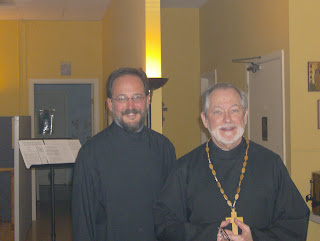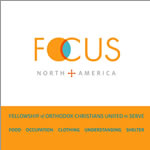On this Sunday of the Holy Myrrhbearing Women, we recall their intention to anoint the corpse of our Lord on that first Pascha morning. Their intentions were graciously and gloriously thwarted by the angel's report of Christ's Resurrection. The women who set out to anoint their Lord's body were instead commissioned to announce the good news of His victory over death and hell to His Apostles.
The following paragraphs were written by Father Olivier Clement in honor of his friend, Father Boris Bobrinskoy. They were included in a recent column by Father John Breck and speak powerfully to the meaning of Pascha today:
In our civilization, so rich in knowledge and in power, we can no longer offer any reply to the enigma of death. We want only to forget death. Yet it meets us again and again in the form of hatred, oppression, separation, illness, and the disappearance of persons we love. This is why the message of Easter, of Holy Pascha, resounds today with such renewed strength. God takes on human flesh, suffers, dies, and descends into hell, in order to destroy both death and hell, and to grant us life.
“Henceforth all is filled with light,” we proclaim at the Paschal celebration, “heaven, the earth, and even hell itself.”
The Body of the crucified Lord is enlivened by the Holy Spirit. It has become the Eucharistic Body of human kind and of the universe as a whole. No one nor any thing is separated from Christ. His victory over death is a victory over separation. His life becomes our own so completely that the apostle Paul can declare: “It is no longer I who live, but Christ who lives in me!” (Gal 2:20).
This is why Christ’s Resurrection concerns us and takes hold of us today. Now, today, we are called to die in Him, in order to rise up in Him. Saint Paul calls us to be conformed with Christ in death, in communion with His suffering, in order “to know Him and the power of His Resurrection” (Phil 3:10), in order to yield ourselves to Him as those “who have been brought from death to life” (Rom 6:13). From this time forth the Resurrection determines our very being. If we assume our suffering, even our agony, with humble abandon, with a perfectly humble and childlike confidence, we will be able to unite them to the suffering and agony of Christ. We will find that they issue in a life that is stronger than death. Once it seemed that Christ had died, yet death exists no longer. Once we wept over those who had passed away, yet now we find that they are not dead but are alive in Christ, and in close communion with us.
The Resurrection enables us to welcome others and to love them with a wholly disinterested love. I no longer need to make another person into a scape-goat for my distress, my pain, since death has been vanquished, and my inner anguish has been transformed into trusting confidence.
Today, ironically, humanity flees death while it multiplies the means of its own suicide. Christians, therefore, have above all else the obligation to proclaim the great joy of Holy Pascha. Their primary task is to announce and to manifest the glory of Pascha: by the beauty of liturgical celebration and by the witness of the saints, as by the accusations and promises of the Prophets. They are called to proclaim and to radiate Paschal joy by the words and gestures of their every-day interactions with others, by their prayer, but also by their work, by their art, by their acts of tenderness. This Paschal proclamation can even perfect science and technology, together with every aspect of our modern life.
Our radiant proclamation of Christ’s victory should include a struggle against every form of death, within us and around us, as well as within our culture and society. For Christ’s Resurrection is not merely an increased assurance that our souls are immortal. Its purpose is to rekindle life and love throughout the entire earth: every living being and every object, every moment, every person, everything, in fact, from a blade of grass to the galaxies of outer space. Everything without exception should find its place within the glorious Body of the Resurrected Lord.
We are called to announce and radiate this resurrectional joy throughout all of history, in order to prepare for Christ’s return. This includes a return of all things to Christ and in Christ, made possible, by anticipation, in the signs put forth by what the contemporary French poet Pierre Emmanuel called “a culture of being and of faces.” All of us are capable of facilitating this return, this universal incorporation of all things into Christ, even if we are lying immobilized in a hospital bed. All that is required is a little confidence, a little love, a little joy. These things, together with a humble prayer of self-effacement, which will allow the energy of the Resurrection to burst forth upon the world.











